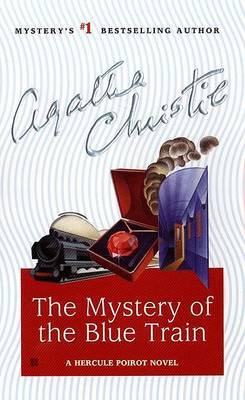Reviewed by brokentune on
I have always thought of The Mystery of the Blue Train as a strange story - not a first rate mystery, not a complete mess, but most definitely not a memorable Christie classic.
As Christie herself tells us in her autobiography, she was not fond of this story either - partly because she didn't feel like she managed to flesh out the characters so they would come alive on the page, and partly because she wrote this story under the pressures of having to earn a paycheck after the separation from her first husband.
I felt more strongly than ever that everything I was saying was idiotic! (Most of it was, too.) I faltered, stammered, hesitated, and repeated myself. Really, how that wretched book ever came to be written, I don’t know! To begin with, I had no joy in writing, no elan. I had worked out the plot–a conventional plot, partly adapted from one of my other stories. I knew, as one might say, where I was going, but I could not see the scene in my mind’s eye, and the people would not come alive. I was driven desperately on by the desire, indeed the necessity, to write another book and make some money. That was the moment when I changed from an amateur to a professional. I assumed the burden of a profession, which is to write even when you don’t want to, don’t much like what you are writing, and aren’t writing particularly well. I have always hated The Mystery of the Blue Train, but I got it written, and sent off to the publishers. It sold just as well as my last book had done. So I had to content myself with that–though I cannot say I have ever been proud of it.
Agatha Christie - An Autobiography (pp. 357-358). HarperCollins Publishers. Kindle Edition.
And indeed, for me, too, there is little that stood out in the characters when I first read the story, and the crime and it's motive are, while horrible, fairly uninteresting.
As a result, I have always looked at this story as a first draft of what would become one of my favourite Christie classics - Murder on the Orient Express.
On this most recent re-read, however, details that were not strictly connected with the whodunnit revealed themselves that gave the story another layer, that connected this odd little story to the rest, and the best, of the Christie universe.
If you look closely, you can find that one of the characters, Katherine Grey, does not only have the spark of the brightest of Christie's young things but she's also come from that most intriguing of little villages - that cradle of human psychology in the Christie universe - St Mary Mead, home of a certain fierce and judgmental little old lady whom I can't stand but who, one has to admit, has a certain flair for snooping out crime.
This is as close as we get to Marple and Poirot ever meeting in the same book. They don't (and Christie herself was not in favour of them meeting), but The Mystery of the Blue Train seems like one of the key steps in Christie's development of the Marple series, even if this was perhaps not what the author intended.
The full force of Marple would hit the reading public two years later in Murder at the Vicarage, but there are some hints at village life that seem to have already been on Christie's mind when penning Blue Train. For the Christie enthusiast - or Agathyte as a friend, Moonlight Reader, has christened us fans - this is a delicious little detail that makes the book worth reading if it lacks much of the intelligent and complex plotting of a great Christie novel.
Reading updates
- Started reading
- 17 February, 2019: Finished reading
- 17 February, 2019: Reviewed
